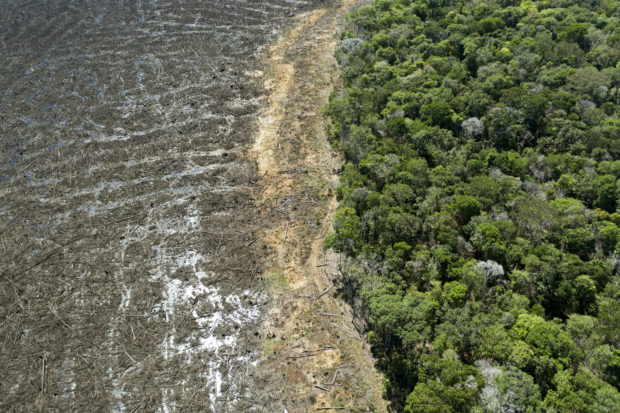
In this file photo taken on August 07, 2020, aerial picture of a deforested area close to Sinop, Mato Grosso State, Brazil. – A total of 580.55 square kilometers were deforested in the Brazilian Amazon in April 2021, a record level for the month, according to official data released on May 7, 2021, defying President Jair Bolsonaro’s promises to reduce deforestation. (Photo by Florian PLAUCHEUR / AFP)
Rio de Janeiro, Brazil — Brazil’s greenhouse gas emissions rose by 9.5 percent last year, mostly because of deforestation, a report said Thursday, making it one of the only major economies not to cut pollution as the pandemic hit.
Even as worldwide emissions fell seven percent in 2020 — a silver lining of COVID-19 stay-at-home measures that paralyzed the global economy — Brazil released the equivalent of 2.16 billion tonnes of carbon dioxide, its highest since 2006, said the report from the Climate Observatory, a coalition of environmental groups.
“The increase in deforestation in Brazil, particularly in the Amazon rainforest, put the country at odds with the trend seen in the rest of the planet,” it said.
Deforestation in Brazil has surged since far-right President Jair Bolsonaro took office in 2019 with a push to open protected lands to agribusiness and mining.
Like most countries, Brazil, Latin America’s largest economy, reduced pollution from the energy sector last year as the pandemic brought industry and aviation to a standstill.
Emissions there fell by 4.6 percent, to levels not seen since 2011.
But that gain was more than offset by increases of 2.5 percent for the agricultural sector and 23.7 percent for “land use changes,” which includes the cutting and burning of trees.
Driven largely by farming and cattle ranching, such land clearing releases carbon into the atmosphere — a major problem for the world’s biggest producer and exporter of soy and beef.
Under Bolsonaro, the Brazilian Amazon has lost more than 10,000 square kilometers (3,860 square miles) a year of forest cover, an area the size of Lebanon, up from 6,500 square kilometers a year over the previous decade.
Climate Observatory executive secretary Marcio Astrini blamed Bolsonaro’s “anti-policies” on the environment for the emissions increase.
“Brazil managed the feat of being perhaps the only major carbon emitter to pollute more in the first year of the pandemic,” he said in a statement.
“This is one more blow to the international image of the country, which arrives completely discredited to the COP26” — the upcoming UN climate summit.
Opening Sunday in Glasgow, it is the biggest climate conference since the 2015 Paris talks produced a landmark accord on curbing global warming, and is seen as crucial for setting global emissions-cutting targets.